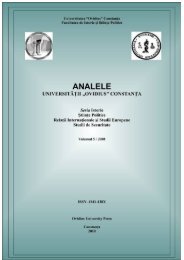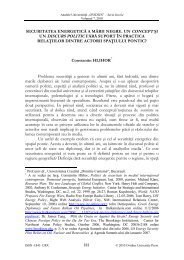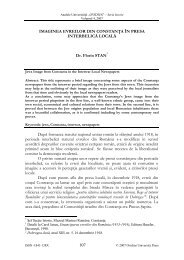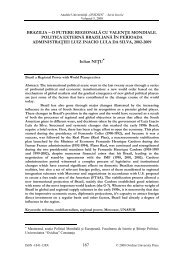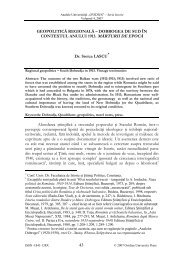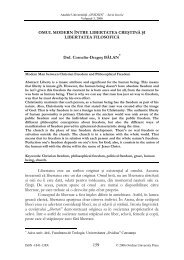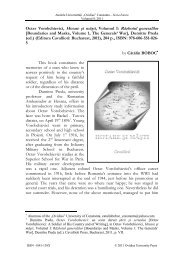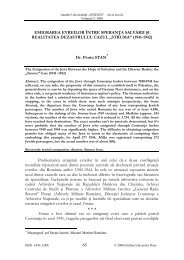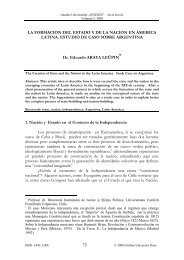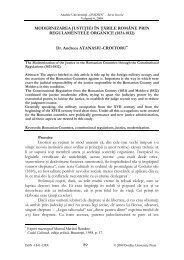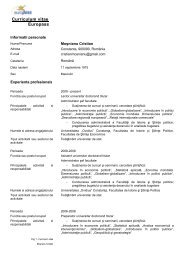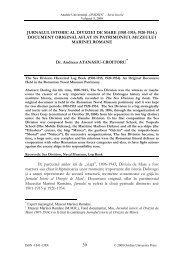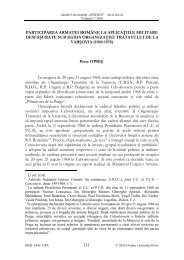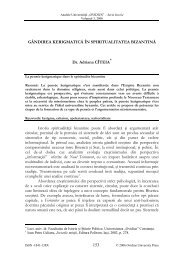analele universitÄÅ£ii âovidiusâ constanÅ£a - AUOCSI
analele universitÄÅ£ii âovidiusâ constanÅ£a - AUOCSI
analele universitÄÅ£ii âovidiusâ constanÅ£a - AUOCSI
Create successful ePaper yourself
Turn your PDF publications into a flip-book with our unique Google optimized e-Paper software.
Alexey A. Gromyko / Analele Universităţii „OVIDIUS” / Vol. 6/ 2009<br />
US. The current in-between status of Russia may be explained from an<br />
axiological perspective: the country is still placing itself within the coordinates of<br />
Modernity. Values, which have emerged after 1991, align Russia with the US;<br />
while Soviet or pre-Soviet values paradoxically drives it closer to the European<br />
dream (for example, such components of the Russian mentality as universalism,<br />
in Soviet terminology – internationalism, and collectivism).<br />
The “slow history” approach also poses a question of an age and name<br />
of civilization. For example, does the name “European civilization” match the<br />
idea of the “slow history” if it was invented after the First World War Perhaps,<br />
yes, because giving a name to some objective process is not the same as a<br />
process itself. From the perspective of present knowledge, it is hard not to agree<br />
with the idea that since the Middle Ages, Europe as a subcontinent has been an<br />
interrelated political, social, economic, and cultural organism whose citizens<br />
have felt belonging to a single space, even if it was full of dangers and<br />
contradictions. Speaking about the “European civilization”, we bear in mind a<br />
two-thousand-year history which has merged of the three ancient civilizations<br />
(or proto-civilizations), i.e. Greek, Roman and German.<br />
The term “Soviet civilization” was also coined in the 20 th century. The<br />
term doesn’t apparently match the criterion of the “slow history”. Unlike the<br />
“European civilization”, which has become an expression of a centuries-long<br />
phenomenon, it pretended to be something new and different, with a centurieslong<br />
history rooted not in the past but in the future. Definitely, the “Soviet<br />
civilization” carried a grain of a new quality because it was based on<br />
expectations of quality transformation of people’s identities. With hindsight we<br />
can say that the “Soviet civilization” was an experiment, partly successful, with<br />
the eastern branch of the European civilization, rooted in the early Middle Ages.<br />
In the intercivilizational research done at the Institute of Europe of the<br />
Russian Academy of Sciences, the study of civilizational identity of Russia<br />
follows several paths. Firstly, Russia is seen as an inherent part of Europe, as a<br />
natural part of the European civilization. This idea doesn’t contradict the fact of<br />
Russia has its own, vividly expressed identity and specifics which are seemingly<br />
resisting being dissolved in the European milieu. In other words, Russia is a<br />
different Europe. Interestingly, the same can be said about identities of other<br />
large countries of Europe – France, Germany, Italy, Spain, etc. Moreover, the<br />
sense of local identities is growing as Europe is increasingly comes in contact<br />
with other civilizational communities. The idea of a single European civilization<br />
has both its adepts (idealists) and pragmatists. Criteria of attributing Russia to<br />
Europe vary greatly. For example, scarcely anyone questions common culturalhistorical<br />
aspects but many think the subject of political economy contains<br />
principal differences.<br />
Secondly, “civilizationally, Russia is neither a western part of the East<br />
nor an eastern part of the West. It is a self-sufficient civilization, and the<br />
ISSN -1841-138X 28 © 2009 Ovidius University Press



